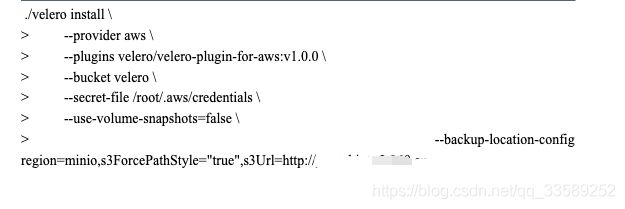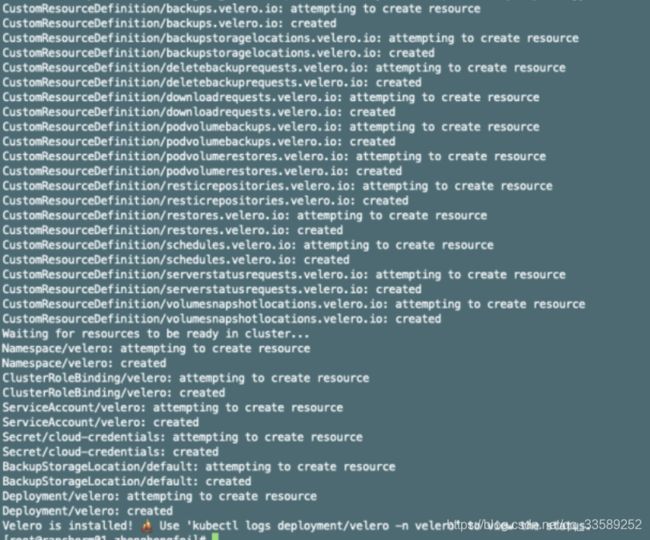kubernetes velero 使用奇技淫巧
你是否在运维kubernetes集群中有过这样的经历:
一个新人把某个namespace点击删除,导致这下面所有的资源全部丢失,只能一步一步的重新部署。
新搭建集群,为了保证环境尽可能一致,只能从老集群拿出来yaml文件在新集群中疯狂apply。
令人抓狂的瞬间随之而来的就是浪费大好青春的搬砖时光。
现在已经开源了很多集群资源对象备份的工具,把这些工具利用起来让你的工作事半功倍,不在苦逼加班。
集群备份比较
etcd备份
etcd备份可以实现K8S集群的备份,但是这种备份一般是全局的,可以恢复到集群某一时刻的状态,无法精确到恢复某一资源对象,一般使用快照的形式进行备份和恢复。
# 备份
#!/usr/bin/env bash
date;
CACERT="/opt/kubernetes/ssl/ca.pem"
CERT="/opt/kubernetes/ssl/server.pem"
EKY="/opt/kubernetes/ssl/server-key.pem"
ENDPOINTS="192.168.1.36:2379"
ETCDCTL_API=3 etcdctl \
--cacert="${CACERT}" --cert="${CERT}" --key="${EKY}" \
--endpoints=${ENDPOINTS} \
snapshot save /data/etcd_backup_dir/etcd-snapshot-`date +%Y%m%d`.db
# 备份保留30天
find /data/etcd_backup_dir/ -name *.db -mtime +30 -exec rm -f {} \;
# 恢复
ETCDCTL_API=3 etcdctl snapshot restore /data/etcd_backup_dir/etcd-snapshot-20191222.db \
--name etcd-0 \
--initial-cluster "etcd-0=https://192.168.1.36:2380,etcd-1=https://192.168.1.37:2380,etcd-2=https://192.168.1.38:2380" \
--initial-cluster-token etcd-cluster \
--initial-advertise-peer-urls https://192.168.1.36:2380 \
--data-dir=/var/lib/etcd/default.etcd
资源对象备份
对于更小粒度的划分到每种资源对象的备份,对于误删除了某种namespace或deployment以及集群迁移就很有用了。
现在开源工具有很多都提供了这样的功能,比如Velero, PX-Backup,Kasten。
velero:
Velero is an open source tool to safely backup and restore, perform disaster recovery, and migrate Kubernetes cluster resources and persistent volumes.
PX-Backup:
Built from the ground up for Kubernetes, PX-Backup delivers enterprise-grade application and data protection with fast recovery at the click of a button
Kasten:
Purpose-built for Kubernetes, Kasten K10 provides enterprise operations teams an easy-to-use, scalable, and secure system for backup/restore, disaster recovery, and mobility of Kubernetes applications.
velero
Velero lets you:
- Take backups of your cluster and restore in case of loss.
- Migrate cluster resources to other clusters.
- Replicate your production cluster to development and testing clusters.
官方介绍的velero提到了以上三个功能,主要就是备份恢复和迁移。
安装
可以通过命令行的方式安装,helm,yaml很多方法,举个例子:

可以看到创建了很多crd,并最终在velero namespace下将应用跑起来了。其实从crd的命名上就可以看出他大概有哪些用途了。

定时备份
对于运维人员来说,对外提供一个集群的稳定性保证是必不可少的,这就需要我们开启定时备份功能。
通过命令行能够开始定时任务,指定那么分区,保留多少时间的备份数据,每隔多长时间进行备份一次。
Examples:
# Create a backup every 6 hours
velero create schedule NAME --schedule="0 */6 * * *"
# Create a backup every 6 hours with the @every notation
velero create schedule NAME --schedule="@every 6h"
# Create a daily backup of the web namespace
velero create schedule NAME --schedule="@every 24h" --include-namespaces web
# Create a weekly backup, each living for 90 days (2160 hours)
velero create schedule NAME --schedule="@every 168h" --ttl 2160h0m0s
velero create schedule 360cloud --schedule="@every 24h" --ttl 2160h0m0s
Schedule "360cloud" created successfully.
[root@xxxxx ~]# kubectl get schedules --all-namespaces
NAMESPACE NAME AGE
velero 360cloud 40s
[root@xxxxx ~]# kubectl get schedules -n velero 360cloud -o yaml
apiVersion: velero.io/v1
kind: Schedule
metadata:
generation: 3
name: 360cloud
namespace: velero
resourceVersion: "18164238"
selfLink: /apis/velero.io/v1/namespaces/velero/schedules/360cloud
uid: 7c04af34-1529-4b48-a3d1-d2f5e98de328
spec:
schedule: '@every 24h'
template:
hooks: {}
includedNamespaces:
- '*'
ttl: 2160h0m0s
status:
lastBackup: "2021-03-07T08:18:49Z"
phase: Enabled
集群迁移备份
对于我们要迁移部分的资源对象,可能并没有进行定时备份,可能有了定时备份,但是想要最新的数据。那么备份一个一次性的数据用来迁移就好了。
velero backup create test01 --include-namespaces default
Backup request "test01" submitted successfully.
Run `velero backup describe test01` or `velero backup logs test01` for more details.
[root@xxxxx ~]# velero backup describe test01
Name: test01
Namespace: velero
Labels: velero.io/storage-location=default
Annotations: velero.io/source-cluster-k8s-gitversion=v1.19.7
velero.io/source-cluster-k8s-major-version=1
velero.io/source-cluster-k8s-minor-version=19
Phase: InProgress
Errors: 0
Warnings: 0
Namespaces:
Included: default
Excluded: <none>
Resources:
Included: *
Excluded: <none>
Cluster-scoped: auto
Label selector: <none>
Storage Location: default
Velero-Native Snapshot PVs: auto
TTL: 720h0m0s
Hooks: <none>
Backup Format Version: 1.1.0
Started: 2021-03-07 16:44:52 +0800 CST
Completed: <n/a>
Expiration: 2021-04-06 16:44:52 +0800 CST
Velero-Native Snapshots: <none included>
备份之后可以使用describe logs去查看更详细的信息。
在另外的集群中使用restore就可以将集群数据恢复了。
[root@xxxxx ~]# velero restore create --from-backup test01
Restore request "test01-20210307164809" submitted successfully.
Run `velero restore describe test01-20210307164809` or `velero restore logs test01-20210307164809` for more details.
[root@xxxxx ~]# kuebctl ^C
[root@xxxxx ~]# kubectl get pod
NAME READY STATUS RESTARTS AGE
nginx-6799fc88d8-4bnfg 0/1 ContainerCreating 0 6s
nginx-6799fc88d8-cq82j 0/1 ContainerCreating 0 6s
nginx-6799fc88d8-f6qsx 0/1 ContainerCreating 0 6s
nginx-6799fc88d8-gq2xt 0/1 ContainerCreating 0 6s
nginx-6799fc88d8-j5fc7 0/1 ContainerCreating 0 6s
nginx-6799fc88d8-kvvx6 0/1 ContainerCreating 0 5s
nginx-6799fc88d8-pccc4 0/1 ContainerCreating 0 5s
nginx-6799fc88d8-q2fnt 0/1 ContainerCreating 0 4s
nginx-6799fc88d8-r9dqn 0/1 ContainerCreating 0 4s
nginx-6799fc88d8-zqv6v 0/1 ContainerCreating 0 4s
PVC的备份迁移
如果是Amazon EBS Volumes, Azure Managed Disks, Google Persistent Disks的存储类型,velero 允许为PV打快照,作为备份的一部分。
其他类型的存储可以使用插件的形式,实现备份。
velero install --use-restic
apiVersion: v1
kind: Pod
metadata:
annotations:
backup.velero.io/backup-volumes: mypvc
name: rbd-test
spec:
containers:
- name: web-server
image: nginx
volumeMounts:
- name: mypvc
mountPath: /var/lib/www/html
volumes:
- name: mypvc
persistentVolumeClaim:
claimName: rbd-pvc-zhf
readOnly: false
可以通过opt-in,opt-out的形式,为pod添加注解来进行选择需要备份的pod中的volume。
velero backup create testpvc05 --snapshot-volumes=true --include-namespaces default
Backup request "testpvc05" submitted successfully.
Run `velero backup describe testpvc05` or `velero backup logs testpvc05` for more details.
[root@xxxx ceph]# velero backup describe testpvc05
Name: testpvc05
Namespace: velero
Labels: velero.io/storage-location=default
Annotations: velero.io/source-cluster-k8s-gitversion=v1.19.7
velero.io/source-cluster-k8s-major-version=1
velero.io/source-cluster-k8s-minor-version=19
Phase: Completed
Errors: 0
Warnings: 0
Namespaces:
Included: default
Excluded: <none>
Resources:
Included: *
Excluded: <none>
Cluster-scoped: auto
Label selector: <none>
Storage Location: default
Velero-Native Snapshot PVs: true
TTL: 720h0m0s
Hooks: <none>
Backup Format Version: 1.1.0
Started: 2021-03-10 15:11:26 +0800 CST
Completed: 2021-03-10 15:11:36 +0800 CST
Expiration: 2021-04-09 15:11:26 +0800 CST
Total items to be backed up: 92
Items backed up: 92
Velero-Native Snapshots: <none included>
Restic Backups (specify --details for more information):
Completed: 1
删除pod和pvc
[root@xxxxxx ceph]# kubectl delete pod rbd-test
pod "rbd-test" deleted
kubectl delete pvc[root@p48453v ceph]# kubectl delete pvc rbd-pvc-zhf
persistentvolumeclaim "rbd-pvc-zhf" deleted
恢复资源对象
[root@xxxxx ceph]# velero restore create testpvc05 --restore-volumes=true --from-backup testpvc05
Restore request "testpvc05" submitted successfully.
Run `velero restore describe testpvc05` or `velero restore logs testpvc05` for more details.
[root@xxxxxx ceph]#
[root@xxxxxx ceph]# kuebctl^C
[root@xxxxxx ceph]# kubectl get pod
NAME READY STATUS RESTARTS AGE
nginx-6799fc88d8-4bnfg 1/1 Running 0 2d22h
rbd-test 0/1 Init:0/1 0 6s
数据恢复显示
[root@xxxxxx ceph]# kubectl exec rbd-test sh -- ls -l /var/lib/www/html
total 20
drwx------ 2 root root 16384 Mar 10 06:31 lost+found
-rw-r--r-- 1 root root 13 Mar 10 07:11 zheng.txt
[root@xxxxxx ceph]# kubectl exec rbd-test sh -- cat /var/lib/www/html/zheng.txt
zhenghongfei
[root@xxxxx ceph]#
Hook
Velero支持在备份期间在Pod中的容器中执行命令。
metadata:
name: nginx-deployment
namespace: nginx-example
spec:
replicas: 1
selector:
matchLabels:
app: nginx
template:
metadata:
labels:
app: nginx
annotations:
pre.hook.backup.velero.io/container: fsfreeze
pre.hook.backup.velero.io/command: '["/sbin/fsfreeze", "--freeze", "/var/log/nginx"]'
post.hook.backup.velero.io/container: fsfreeze
post.hook.backup.velero.io/command: '["/sbin/fsfreeze", "--unfreeze", "/var/log/nginx"]'
引导使用前置和后置挂钩冻结文件系统。冻结文件系统有助于确保所有挂起的磁盘IO操作在拍摄快照之前已经完成。
当然我们可以使用这种方式执行备份mysql或其他的文件,但是只建议使用小文件会备份恢复,针对于pod进行备份恢复。
探究备份实现
查找有哪些资源对象需要备份
collector := &itemCollector{
log: log,
backupRequest: backupRequest,
discoveryHelper: kb.discoveryHelper,
dynamicFactory: kb.dynamicFactory,
cohabitatingResources: cohabitatingResources(),
dir: tempDir,
}
items := collector.getAllItems()
调用函数
func (kb *kubernetesBackupper) backupItem(log logrus.FieldLogger, gr schema.GroupResource, itemBackupper *itemBackupper, unstructured *unstructured.Unstructured, preferredGVR schema.GroupVersionResource) bool {
backedUpItem, err := itemBackupper.backupItem(log, unstructured, gr, preferredGVR)
if aggregate, ok := err.(kubeerrs.Aggregate); ok {
log.WithField("name", unstructured.GetName()).Infof("%d errors encountered backup up item", len(aggregate.Errors()))
// log each error separately so we get error location info in the log, and an
// accurate count of errors
for _, err = range aggregate.Errors() {
log.WithError(err).WithField("name", unstructured.GetName()).Error("Error backing up item")
}
return false
}
if err != nil {
log.WithError(err).WithField("name", unstructured.GetName()).Error("Error backing up item")
return false
}
return backedUpItem
}
通过clientset方式获取相应的资源
client, err := ib.dynamicFactory.ClientForGroupVersionResource(gvr.GroupVersion(), resource, additionalItem.Namespace)
if err != nil {
return nil, err
}
item, err := client.Get(additionalItem.Name, metav1.GetOptions{})
将数据保存到文件中。
log.Debugf("Resource %s/%s, version= %s, preferredVersion=%s", groupResource.String(), name, version, preferredVersion)
if version == preferredVersion {
if namespace != "" {
filePath = filepath.Join(velerov1api.ResourcesDir, groupResource.String(), velerov1api.NamespaceScopedDir, namespace, name+".json")
} else {
filePath = filepath.Join(velerov1api.ResourcesDir, groupResource.String(), velerov1api.ClusterScopedDir, name+".json")
}
hdr = &tar.Header{
Name: filePath,
Size: int64(len(itemBytes)),
Typeflag: tar.TypeReg,
Mode: 0755,
ModTime: time.Now(),
}
if err := ib.tarWriter.WriteHeader(hdr); err != nil {
return false, errors.WithStack(err)
}
if _, err := ib.tarWriter.Write(itemBytes); err != nil {
return false, errors.WithStack(err)
}
}
其他的备份工具
PX-Backup 需要交费的产品,人民币玩家可以更加强大。
kanister更倾向于数据上的存储和恢复,比如etcd的snap,mongo等。
参考链接:
https://github.com/vmware-tanzu/velero
https://portworx.com/
https://www.kasten.io/
https://github.com/kanisterio/kanister
https://duyanghao.github.io/kubernetes-ha-and-bur/
https://blog.kubernauts.io/backup-and-restore-of-kubernetes-applications-using-heptios-velero-with-restic-and-rook-ceph-as-2e8df15b1487


